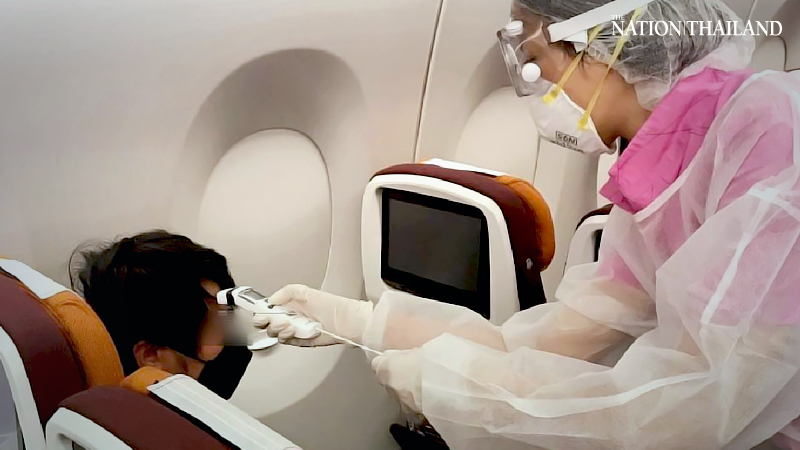
International flights carrying "transit/transfer" passengers are now allowed to arrive at Suvarnabhumi Airport, the Civil Aviation Authority of Thailand (CAAT) confirmed.
However, CAAT has issued a series of guidelines that such passengers and airlines should follow:
1. International flights carrying transit/transfer passengers will be permitted only at Suvarnabhumi Airport;
2. Each passenger should possess a complete set of relevant documents, which are:
(a) A fit-to-fly health certificate;
(b) Medical certificate with a laboratory result showing that Covid-19 is not detected (carried out by the RT-PCR technique and issued no more than 72 hours before travel);
(c) Travel health insurance (worldwide or including Thailand) that covers healthcare and treatment expenses for Covid-19, or any other guarantee throughout their stay in the kingdom, with a coverage of not less than US$100,000 (Bt3.08 million).
Before the issuance of a boarding pass, document verification will be carried out by an air operator. If any document is found incorrect or incomplete, the passenger will not be issued a boarding pass.
3. Passengers must not venture out of the specified area (Concourse E) and should proceed through a so-called "sealed route" as detailed below:
(a) Each passenger must disembark via Gate E10, go through security screening and board the transit aircraft via Gate E9, or head to a designated shuttle bus to board the aircraft at the remote parking stand;
(b) If demand exceeds existing capacity, there will be additional operations available at Gate E5, E7 and E8;
(c) Aircraft crew making a "technical" landing should also follow the above conditions.
In case Concourse E is under maintenance, Concourse F will be used under the following procedures:
(d) Each passenger must disembark via Gate F6, go through security screening and board their next aircraft via Gate F5, or get into a designated shuttle bus to board the aircraft at the remote parking stand;
(e) If demand exceeds the existing capacity, there will be additional operations available at Gate F1, F2, F3 and F4;
(f) Aircraft crew should follow the conditions stated in 3 (d) or (e).
4. Physical distancing must be followed in waiting areas for transit/transfer operations. Each passenger and personnel should wear a face mask at all times, except in necessary or emergency situations, and clean their fingers with available hand sanitisers, which contain at least 70 per cent alcohol;

5. Personnel working in waiting areas for transit/transfer operations must wear personal protective equipment.
6. There are food and beverage services in the waiting area. There will be "active oversight" to keep operations safe and effective.
7. Cleaning and disinfection of equipment and passenger areas will be carried out regularly, according to Public Health Ministry standards.
8. The time period of each transit/transfer operation must not exceed 12 hours. If the operation goes past 12 hours, airline staff are responsible for managing/transporting passengers by special bus to Gate D3 and or D4 to await flights.
9. There will be no Covid-19 screening or laboratory services in the transit/transfer areas of the airport.
10. If any passenger takes ill or is suspected to have contracted Covid-19, the airline has to bear full responsibility for the traveller.
11. Passengers are advised to avoid any port of embarkation with a high prevalence of Covid-19, according to the risk level categorised by the Public Health Ministry.
12. Airlines must submit transit/transfer flight plans with CAAT and the Airside Operations Control Centre at Suvarnabhumi Airport no later than 24 hours before the flight.



Inga kommentarer:
Skicka en kommentar